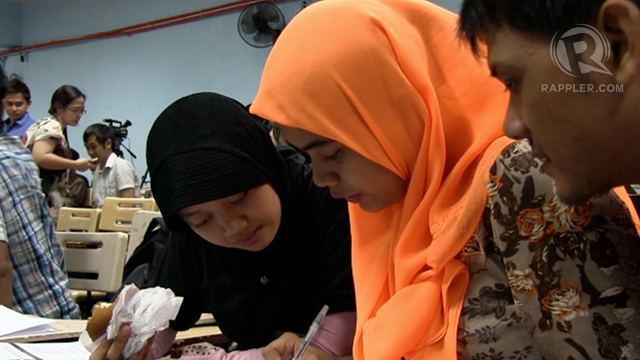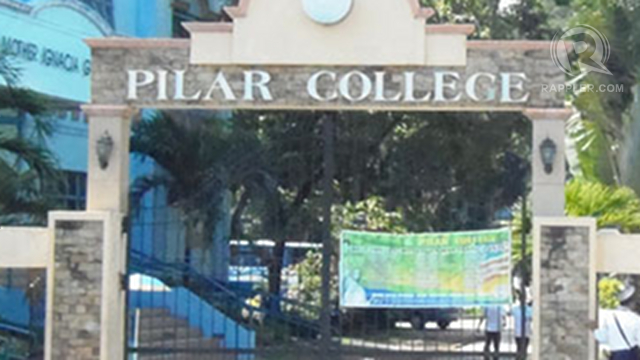SUMMARY
This is AI generated summarization, which may have errors. For context, always refer to the full article.

ZAMBOANGA CITY, Philippines – A Catholic school will soon lift its controversial ban on the Muslim veil called the hijab, following dialogues between Christians and Muslims in the city.
In a joint statement sent to Rappler on Sunday, September 16, Pilar College and the National Commission on Muslim Filipinos (NCMF) said the decision was based on “common values” such as hospitality, communion, sensitivity to the signs of the times, openness to dialogue, and respectful service.
The statement – the product of a dialogue last Friday, September 14 – did not specify when exactly the ban will be lifted. It said the school will do so after implementing “programs toward the voluntary wearing of hijab,” which, for Muslim women, is a sign of modesty and obedience.
Sister Maria Fe Gerodias, representative of the Religious of the Virgin Mary (RVM) congregation’s southern Mindanao province, told Rappler the preparation is needed to prevent discrimination once the ban on the hijab is fully lifted.
In an interview after Friday’s dialogue, Gerodias explained that the school has banned the hijab for over a century – not only recently, as reports said – because some Muslims had experienced discrimination over the veil.
“The Christians do not really understand very well the value and the need for the hijab. That’s why we need to conduct a formative program, educative program, for our Christian parents, to educate students and teachers. And I think that’s also needed for the Muslim communities, because they themselves have varying interpretations of the use of the hijab,” Gerodias said.

Based on the statement, Pilar College’s “social preparation” for involved parties will include the following:
-
Linkages with Muslim institutions to deepen the understanding of the Muslim culture and traditions, particularly in the areas of commonality and partnership opportunities with the Christian community
-
Series of fora with stakeholders on hijab and its significance in Islamic spirituality
-
Inclusion of Comparative Religious Studies as one of the Religious Studies courses
-
Conduct of Marian (Sitti Maryam) dialogue and spirituality fora
-
Regular updates on Christian-Muslim relations
-
Encouraging interfaith and intrafaith dialogues among Muslims and Christians
The NCMF, for its part, will assist Pilar College in implementing the programs, and assign a qualified female representative to regularly participate in implementing the school’s interfaith programs.
“We call on all our beloved students and faculty, parents and alumni, and all those who love and long for peace to bless this commitment with your sincere prayer, active support, and discerned statements,” Pilar College and NCMF said in their joint statement.
It was signed by Gerodias, Pilar College president Sister Maria Nina Balbas, and NCMF Secretary Mehol Sadain. (Read the whole statement in the PDF below.)
Responding to the Signs of the Times: Journeying from Good to Better
Peace in Mindanao
The decision to lift the century-old ban came amid recent protests against it.
NCMF’s commissioner-in-charge for legal affairs, Edilwasif Baddiri, earlier called it a “violation” of the Constitutional mandate to freely exercise one’s religion.
He said it also violated a Department of Education order in 2001, which states: “In the specific case of Muslim students… female Muslim schoolchildren should be allowed to use their veil or headdress (hijab) inside the school campus.” The Commission on Higher Education has issued a similar directive, Baddiri said.
The lifting of the ban, Gerodias pointed out, will stop the worsening of tensions in their community. It will also promote peace in Mindanao, the nun said.
“It’s very important because for the Muslims, that’s an expression of their religious freedom, their religious right, their human right… Recognizing that, giving way to that, we live in peace. After all, it’s not really a big issue if it were given to us. It was just that the media made it a sensational thing, without us knowing actually who complained,” Gerodias explained. (Watch more in the video below.)
Jesuit priest Albert Alejo, who joined discussions between the Pilar College sisters and the NCMF, hailed the “deeper connection” that the two parties found between them.
In an interview with Rappler, Alejo said the two groups may have taken different positions on the matter, but espoused “shared values” that became the starting point for dialogue.
In particular, Alejo said the Pilar College nuns prohibited the hijab “for uniformity, to avoid discrimination” against the Muslims, whose wearing the veil might be frowned upon by Christians and other Muslims who interpret the practice differently.
The NCMF, on the other hand, wanted the ban to be lifted “to avoid discrimination by allowing difference in the campus,” according to Alejo.
“Take note, on the level of position, they are opposite – hijab versus no hijab. On the level of values, come to think of it, both are trying to avoid discrimination, and therefore promoting respect and equality. But there is a difference. One tries to avoid discrimination by hiding the difference. The other one tries to avoid discrimination by accepting the difference,” he explained.
“On that note, then there is room for dialogue,” said Alejo, Ateneo de Zamboanga University’s assistant to the president for social development. (Watch more in the video below.)
Like Gerodias, Alejo believes the decision would lead to peace in their community.
It is also connected to peace in the Philippines and the world as well, Alejo added. “Isang sanhi ng gulo sa mundo ay ang hindi pagtanggap sa kaibahan ng kapwa-tao,” he explained. (One reason for conflict in the world is the non-acceptance of other people’s differences.)
The decision, he said, is made in the context of a world finding peace between Christians and Muslims, and other faiths and ethnicities. – Rappler.com
Add a comment
How does this make you feel?
There are no comments yet. Add your comment to start the conversation.